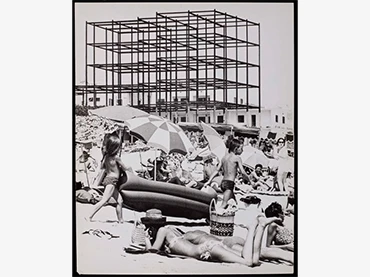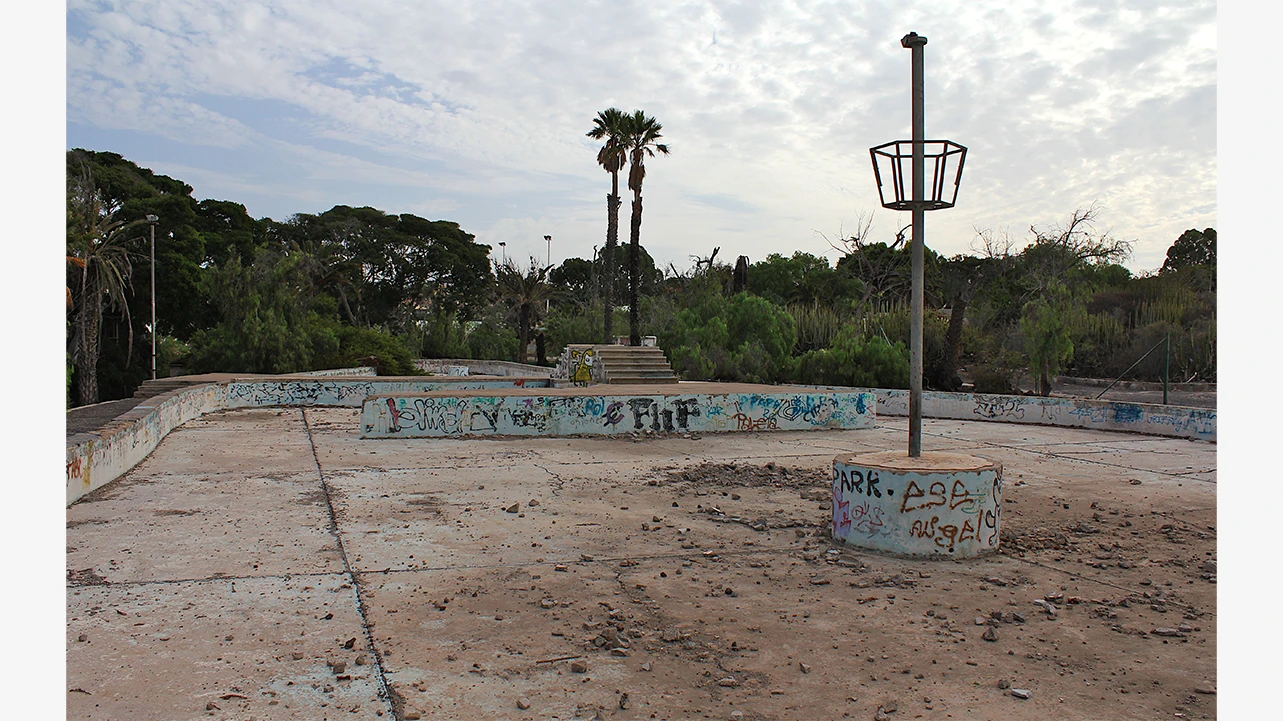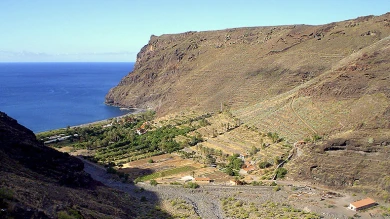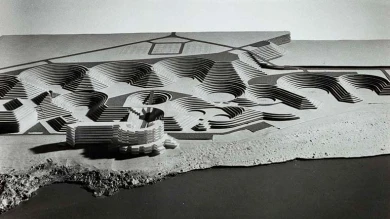Art and Tourism Imaginaries III
Ruins Under Construction. The Attraction of the Inhospitable

Held on 01 Dec 2021
This lecture series, the third instalment organised by the interuniversity group TURICOM — which is part of the project Paradoxical Modernity: Artistic and Tourist Experience in Developmentalist Spain (1959–1975), PGC2018-093422-B-I00 (MCI/AEI/FEDER, UE) — endeavours to examine the relationship between tourist imaginaries and the visual arts from the 1960s onwards. By virtue of a selection of brief talks and a final lecture, followed by a debate, it looks to reflect on mass tourism and the way in which, as the industry of experience, it is connected to the search for lived experience that has shaped art ever since. More specifically, this new edition centres on the concept of ruin as a centre of attraction for cultural habits and practices inside the sphere of tourism.
Tourist enclaves maintain a unique relationship with ruin. Not solely because of the sheer number of establishments and infrastructures we might come across in a state of disrepair or ruin, but also because of their tendency to create, in their surroundings, exclusion zones and razed landscapes and, above all else, their proclivity to be erected in deserted spaces. It is no coincidence that the most paradigmatic place in the tourist industry is Las Vegas, a city built in a desert. The desert — along with the sea, snow, and forested and alpine areas — was one of the favourite scenes in the aesthetic of the sublime, that idealised attraction to inhospitable nature which in Romanticism renewed a liking for ruin. Untamed landscapes that were the hidden face of an irreversible process of technification. Opposite the ostensible mastery of technology, the nostalgia for nature buoyed a new idea of untainted spaces, the pictorial spectacle of unique, out-of-scale nature which banished the human figure from landscapes whose chief symbolic quality consisted of, in fact, being uninhabitable.
That uninhabitable nature came to “sublimate” problems of habitability in the modern city. When the urbanite dreamed of the spectacle of free and primeval nature, or places where life was more natural, the nascent tourist industry safeguarded this dream, feeding and monetising the ideal. Since then, tourism has continued to bolster the paradoxical attraction of the inhospitable and, as city life deepened the feeling of malaise, the tourist-based trivialisation of the sublime offered comfortable lodgings in remote locations that were temptingly inhospitable and, consequently, unliveable for us. This contradictory desire to inhabit the uninhabitable is met by the industry, which erects enclaves on emptiness and builds accommodation and entertainment infrastructures that tap into the illusionary image of an authentic place, yet without being part of it. Thus, the tendency of these settings to fall into disrepair and decay, with their only role being to monetise the flow of people, remains exposed to their transitory nature, subjected to the fate of shifting currents. But there is another thing: the production of habitats to enjoy the comfort of the inhospitable is the furthest possible thing from hospitality. A clear indication that its implementation is not aimed at the community creation of place, but rather at its decline.
[dropdown]
Eugenia Afinoguénova is a professor of Spanish Literature and Cultural History at Marquette University (Milwaukee, Wisconsin, USA). Her most recent publication is El Prado: la cultura y el ocio (1819-1939) (Cátedra, 2019).
Manuel Delgado Ruiz holds a PhD in Anthropology and is a professor at the University of Barcelona. Since 1984, he has been head professor of Religious Anthropology in the Social Anthropology Department at the same university. He is also the editor and author of numerous publications, most notably: El animal público (Premio Anagrama de Ensayo, 1999), Sociedades movedizas (Anagrama, 2007) and La ciudad mentirosa. Fraude y miseria del “modelo Barcelona” (Catarata, 2007).
José Díaz Cuyás is a professor of Aesthetics and Art Theory at the University of La Laguna. With Carmen Pardo and Esteban Pujals, he curated the exhibition Pamplona Encounters 1972. The End of the Party for Experimental Art (Museo Reina Sofía, 2009–2010), and his most recent publications include coordinating issue 10 (on art and tourism) of the magazine Concreta, and “Movilizados por lo real: turistas, soldados, artistas” (on Marcel Broodthaers), in Arquitectura: lenguajes fílmicos (2009-2016) (Tabakalera, 2018).
Julián Díaz Sánchez is a professor of Art History at the University of Castilla-La Mancha (UCLM), and has written, among other works, Políticas, poéticas y prácticas artísticas. Apuntes para una historia del arte (Catarata, 2009), La idea de arte abstracto en la España de Franco (Cátedra, 2013) and Pensar la historia del arte. Viejas y nuevas propuestas (Universidad de Zaragoza, 2021).
Pablo Estévez Hernández holds a PhD in Anthropology from the University of La Laguna and is a professor of Anthropology from the same university. Moreover, he is a professor of Anthropology of Tourism at the Iriarte University School of Tourism. Notable among his publications are: “What about the hardcore? Pensando el turismo, el poder y la transculturación en Canarias” in ¡Autonomía! ¡Automatización! (TEA Tenerife Espacio de las Artes, 2019) and “El bautismo de una isla. Sobre ese terrible acto de nombrar” in Desmitificación y redescubrimiento de las Fortunatae Insulae. Tenerife y Canarias de los siglos I al XV (Minutes from the 8th BIEREHITE Sessions, Museo de Historia y Antropología de Tenerife, 2019).
Alicia Fuentes Vega holds a PhD in Contemporary Art History. In 2018, she joined the Art History Department at the Complutense University of Madrid, where she co-directs the research group Imaginaries. Cultural Processes in Western Contemporaneity. Her publications include articles in academic journals such as Journal of Tourism History, Iberoamericana o Art in Translation, most notably Bienvenido, Mr. Turismo. Cultura visual del boom (Cátedra, 2017).
Isaac Marrero is a professor of Anthropology at the University of Barcelona. His publications most notably include de Antropología en la Universidad de Barcelona. Entre sus publicaciones se encuentran The Art of Dissent: Adventures in London’s Olympic State, with Hilary Powell (Marshgate Press, 2012), and Reassembling Activism, Activating Assemblages, with Denise Milstein and Israel Rodríguez-Giralt (Routledge, 2019).
[/dropdown]
Programme
5pm Presentation
José Díaz Cuyás
5:10pm The Horizon of Spanish Tourism’s Extractivism
Eugenia Afinoguénova
In 1962, Ediciones del Movimiento published Nuevo horizonte del turismo Español (The New Horizon of Spanish Tourism). Attributed to Manuel Fraga Iribarne, the future designer of tourist-based developmentalism, the book offered a strategy for converting economic and social underdevelopment into a tourist attraction by means of controlled preservation. This talk, therefore, delves into the consequences of this strategy, still visible today, contending the start-up of processes to redistribute the symbolic and material assets which allowed the tourist industry to be equated with extractivism.
5:25pm Between Desolation and Promise. The (Symbolic) Construction of the Spanish Tourism Landscape
Julián Díaz Sánchez
Built upon ruin, the tourist landscape — glistening, new, ludic — appeared as some kind of miracle, consumed as a spectacle (the second definition of the term landscape in the María Moliner Dictionary of Spanish Usage was: “the countryside considered as a spectacle”. The process of (mythical) construction can be traced back to literature and painting, which, on many occasions, appear to engender nostalgia.
5:40pm The Strange Thing Is that it Remains a Hotel. A New Theory of Broken Windows for Tourism
Pablo Estévez Hernández
In a dilapidated hotel we can make out telephones which are still connected, fire extinguishers lined up, dust-covered glasses, and every kind of sign stating rules to workers. The windows are smashed and there are no tourists… Yet, isn’t there the distinct feeling that it not only remains a hotel, but is also a happy place? Can something so unstable and undefinable such as tourism endure in things? This talk looks to provide an answer to these questions.
5:55pm Politics and Aesthetics of Suspension. Monument to Tolerance by Eduardo Chillida
Isaac Marrero
This presentation explores an unbuilt project which is not completely abandoned: Chillida’s Monument of Tolerance. The concept of suspension enables us to think about a form of existence characterised by a multiple temporality (between anticipation and nostalgia) and a distributed materiality (maquettes, simulations and budget allocations).
6:10pm Review of Argument Strands from the Lectures and Debate
—Moderated by Alicia Fuentes Vega
6:40pm Break
7:00pm Master lecture. On the Ruins of the Present. Cultural Infrastructures in Disagreeable Environments
Manuel Delgado Ruiz
8:40pm Debate and conclusion
Participants
Participants


Más actividades

Aesthetics of Peace and Desertion Tactics
8 October 2025 – 24 June 2026
The study group Aesthetics of Peace and Tactics of Desertion: Prefiguring New Pacifisms and Forms of Transitional Justice proposes a rethinking—through both a theoretical-critical and historical-artistic lens—of the intricate network of concepts and practices operating under the notion of pacifism. A term not without contestation and critical tension, pacifism gathers under its name a multiplicity of practices—from anti-militarism and anti-war movements to non-violence activism—while simultaneously opening urgent debates around violence, justice, reparation, and desertion. Here, pacifism is not conceived as a moral doctrine, but as an active form of ethical and political resistance capable of generating aesthetic languages and new positions of social imagination.
Through collective study, the group seeks to update critical debates surrounding the use of violence and non-violence, as well as to explore the conflict of their representation at the core of visual cultures. In a present marked by rearmament, war, genocide, and the collapse of the social contract, this group aims to equip itself with tools to, on one hand, map genealogies and aesthetics of peace—within and beyond the Spanish context—and, on the other, analyze strategies of pacification that have served to neutralize the critical power of peace struggles. Transitional and anti-punitive justice proposals will also be addressed, alongside their intersections with artistic, visual, and cinematic practices. This includes examining historical examples of tribunals and paralegal activisms initiated by artists, and projects where gestures, imaginaries, and vocabularies tied to justice, reparation, memory, and mourning are developed.
It is also crucial to note that the study programme is grounded in ongoing reflection around tactics and concepts drawn, among others, from contemporary and radical Black thought—such as flight, exodus, abolitionism, desertion, and refusal. In other words, strategies and ideas that articulate ways of withdrawing from the mandates of institutions or violent paradigms that must be abandoned or dismantled. From feminist, internationalist, and decolonial perspectives, these concepts have nourished cultural coalitions and positions whose recovery today is urgent in order to prefigure a new pacifism: generative, transformative, and radical.
Aesthetics of Peace and Tactics of Desertion, developed and led by the Museo Reina Sofía’s Studies Management, unfolds through biweekly sessions from October to June. These sessions alternate between theoretical discussions, screenings, work with artworks and archival materials from the Museo’s Collection, reading workshops, and public sessions. The group is structured around sustained methodologies of study, close reading, and collective discussion of thinkers such as Judith Butler, Elsa Dorlin, Juan Albarrán, Rita Segato, Sven Lütticken, Ruth Wilson Gilmore, and Franco “Bifo” Berardi; historical episodes such as the anti-nuclear and anti-arms race movement in Spain; and the work of artists and activists including Rojava Film Commune, Manuel Correa and the Oficina de Investigación Documental (Office for Documentary Investigation), and Jonas Staal, among other initial cases that will expand as the group progresses.

Institutional Decentralisation
Thursday, 21 May 2026 – 5:30pm
This series is organised by equipoMotor, a group of teenagers, young people and older people who have participated in the Museo Reina Sofía’s previous community education projects, and is structured around four themed blocks that pivot on the monstrous.
This fourth and final session centres on films that take the museum away from its axis and make it gaze from the edges. Pieces that work with that which is normally left out: peripheral territories, unpolished aesthetics, clumsy gestures full of intent. Instead of possessing an institutional lustre, here they are rough, precarious and strange in appearance, legitimate forms of making and showing culture. The idea is to think about what happens when central authority is displaced, when the ugly and the uncomfortable are not hidden, when they are recognised as part of the commons. Film that does not seek to be to one’s liking, but to open space and allow other ways of seeing and inhabiting the museum to enter stage.

Intergenerationality
Thursday, 9 April 2026 – 5:30pm
This series is organised by equipoMotor, a group of teenagers, young people and older people who have participated in the Museo Reina Sofía’s previous community education projects, and is structured around four themed blocks that pivot on the monstrous.
The third session gazes at film as a place from which to dismantle the idea of one sole history and one sole time. From a decolonial and queer perspective, it explores films which break the straight line of past-present-future, which mix memories, slow progress and leave space for rhythms which customarily make no room for official accounts. Here the images open cracks through which bodies, voices and affects appear, disrupting archive and questioning who narrates, and from where and for whom. The proposal is at once simple and ambitious: use film to imagine other modes of remembering, belonging and projecting futures we have not yet been able to live.

Remedios Zafra
Thursday March 19, 2026 - 19:00 h
The José Luis Brea Chair, dedicated to reflecting on the image and the epistemology of visuality in contemporary culture, opens its program with an inaugural lecture by essayist and thinker Remedios Zafra.
“That the contemporary antifeminist upsurge is constructed as an anti-intellectual drive is no coincidence; the two feed into one another. To advance a reactionary discourse that defends inequality, it is necessary to challenge gender studies and gender-equality policies, but also to devalue the very foundations of knowledge in which these have been most intensely developed over recent decades—while also undermining their institutional support: universities, art and research centers, and academic culture.
Feminism has been deeply linked to the affirmation of the most committed humanist thought. Periods of enlightenment and moments of transition toward more just social forms—sustained by education—have been when feminist demands have emerged most strongly. Awareness and achievements in equality increase when education plays a leading social role; thus, devaluing intellectual work also contributes to harming feminism, and vice versa, insofar as the bond between knowledge and feminism is not only conceptual and historical, but also intimate and political.
Today, antifeminism is used globally as the symbolic adhesive of far-right movements, in parallel with the devaluation of forms of knowledge emerging from the university and from science—mistreated by hoaxes and disinformation on social networks and through the spectacularization of life mediated by screens. These are consequences bound up with the primacy of a scopic value that for some time has been denigrating thought and positioning what is most seen as what is most valuable within the normalized mediation of technology. This inertia coexists with techno-libertarian proclamations that reactivate a patriarchy that uses the resentment of many men as a seductive and cohesive force to preserve and inflame privileges in the new world as techno-scenario.
This lecture will address this epochal context, delving into the synchronicity of these upsurges through an additional parallel between forms of patriarchal domination and techno-labor domination. A parallel in which feminism and intellectual work are both being harmed, while also sending signals that in both lie emancipatory responses to today’s reactionary turns and the neutralization of critique. This consonance would also speak to how the perverse patriarchal basis that turns women into sustainers of their own subordination finds its equivalent in the encouraged self-exploitation of cultural workers; in the legitimation of affective capital and symbolic capital as sufficient forms of payment; in the blurring of boundaries between life and work and in domestic isolation; or in the pressure to please and comply as an extended patriarchal form—today linked to the feigned enthusiasm of precarious workers, but also to technological adulation. In response to possible resistance and intellectual action, patriarchy has associated feminists with a future foretold as unhappy for them, equating “thought and consciousness” with unhappiness—where these have in fact been (and continue to be) levers of autonomy and emancipation.”
— Remedios Zafra

27th Contemporary Art Conservation Conference
Wednesday, 4, and Thursday, 5 March 2026
The 27th Contemporary Art Conservation Conference, organised by the Museo Reina Sofía’s Department of Conservation and Restoration, with the sponsorship of the Mapfre Foundation, is held on 4 and 5 March 2026. This international encounter sets out to share and debate experience and research, open new channels of study and reflect on conservation and the professional practice of restorers.
This edition will be held with in-person and online attendance formats, occurring simultaneously, via twenty-minute interventions followed by a five-minute Q&A.
![Joan Rabascall. Every Day a Fiesta [Cada día una fiesta], 1975](https://recursos.museoreinasofia.es/styles/small_landscape/public/Actividades/espana-g.gif.webp)

